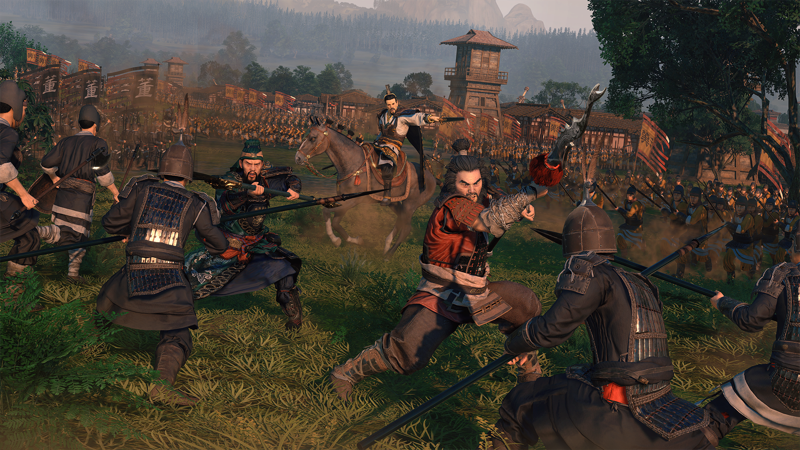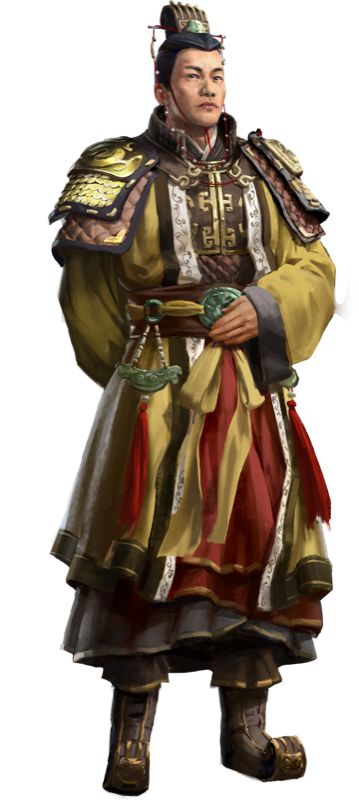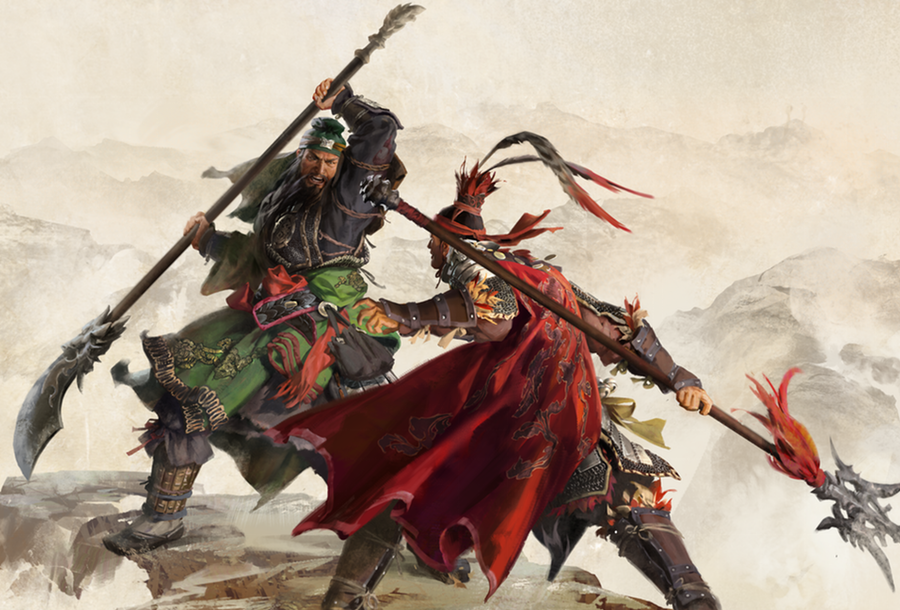We speak with game director Janos Gaspar and writer Pete Stewart about their work in adapting the War of the Three Kingdoms into their latest strategy videogame
Subscribe to All About History now for amazing savings!
For our readers who aren’t too familiar with the Total War series, could you tell us a little about what it is and what historical periods have you covered so far?

Janos Gaspar: Total War is a grand strategy game featuring real-time tactics battles. But it’s all about the stepping into the shoes of someone like Caesar or Napoleon, someone who is bringing a nation or group of people forward through history. The other thing is Total War is many times about immersion. You’re not just making high level decisions – you’re managing settlements, you’re managing agriculture, and you’re managing construction and technological advancements. You get a deep understanding of the era through this authentic recreation of the time.
Pete Stewart: It’s all about building your empire. We’ve done this across ancient Rome, Japan, Napoleonic France, the age of Sale, the Medieval period, and now Three Kingdoms.
How do you go about settling on a new historical period to tackle in the Total War series?
Janos: We start by looking for conflict – either periods in history with prolonged war or even flashpoints of civil war. We look at what’s popular with our fans and what they’re interested in, and of course there are certain periods that stand out to us that we’ve always wanted to do.
What drew you to the late Han Dynasty and the Three Kingdoms as an era that could work for you?

Pete: It’s something both we as a studio and our fans have been talking about for a long time. We looked more closely into it and realized it’s an extremely cool and extremely different period of history than we’re used to tackling. All of the elements fit together. The scale of the conflict is absolutely gigantic, a lot of the interplay between characters fit what we wanted to do with our character system, and it let us dive into complex details like government, reforms, and construction.
Janos: We look for interesting stories that can connect with people who aren’t necessarily history fanatics. Three Kingdoms is something that people have wanted us to do for a while. It was very early on that we found more information that helped us see how we could delve deeper into the era and make it connect with a broader audience. The Romance of the Three Kingdoms, in particular, showed us an interesting perspective and helped us make the period more appealing and relatable. Suddenly we had compelling characters and motivations to help us tell the story. There are certain things that were interpreted later when the book was written that aren’t totally accurate, but you still get a lot of insight into the motivations of people we’re focusing on. If you go into the Napoleonic era, you get biographies or books about the major players but not the wider set – it’s very interesting to have that broader material so we can show how the wider cast of characters each made their mark on this incredible period of conflict.

Is it challenging to find the balance between historical accuracy and what might be fun to play?
Janos: History is very important for us. We start making our games with a setting that is as authentic as possible. But once a player starts, they can change anything. At that point, our responsibility becomes making sure that the world reacts in the right way. So you could say, what if Dong Zhuo in the Three Kingdoms period of time is not going out as this big evil guy, but instead offers peace to everyone? We make sure that if the player chooses to create their own story within our game, the history in our game reacts in an authentic way. What if a player focuses their technological research on one specific thing? Well, that would never happen in history but if the player really wants to drive it, they can. In Attila we let them achieve early knights around 500 – which is absolutely not accurate. It wouldn’t be factual, but you can do it because you can drag history with you and our games will react in a way that’s as authentic as possible.
What have you found from your research of the period that has inspired new gameplay mechanics and ideas for your team?
Janos: The agriculture garrisons that Cao Cao set up is something that is featured prominently in the game. There was a system about basically imperial academy and how people were recommended for service. There was a prominent class of officials that was very important for managing the vast land. These imperial recommendations are now in the game as a detailed court system. Equally, we looked closely at the population and migration systems of the period and how those shaped the territory in the north.
Pete: We have systems like the Guanxi system which is essentially the social networks of the game, the interconnectivity of the characters, whether they like each other or dislike each other, and whether they do or they don’t affects how well they fight together in battle, and how well they fight together in battle affects whether they’ll continue to like or dislike each other. This all affects whether they’ll stay with their faction or leave your faction, which would have a massive impact especially if these characters lead your armies, control your settlements, or hold prominent positions of power within your court. Keeping them all appeased is important but also a fun challenge because you see how all tangled together they all are.
Janos: It’s a representation of how who you knew affected who you could get favours from. Your friends, your family, your boss, your enemies – all of this defined you within the society and we had to represent these themes from Chinese warfare in that time.

How do you go about interpreting different military tactics and unit types into your new games?
Janos: A lot of the unit types and overall military research starts with looking at the archeological records and military books that give us descriptions of individual tactics and their use of strategems – these special tactics that you need to know as a general. Similar to Sun Tzu’s Art of War.
Pete: In the research we found lots of parallels with other periods of history. For instance, cavalry riders would be a higher-class fighter while spearmen or archers would be conscripts. So, we glean little pieces of information from different sources to help inform the process.
Janos: This time in China, the majority of the armies would be spearmen, later armed with the ji. Super efficient and relatively easy to give to a peasant and send them to battle. In our game, we use that understanding to develop the recruitment costs and accessibility of some units over others. Cavalry, for example, is not vastly used at this point in China. Because of that, they’re very expensive units in-game and relatively hard to get. Crossbows, on the other hand, are there from the beginning because they were easy for an untrained person to use.
Pete: Put it in their hands, point and shoot.
How have you integrated the Romance Of The Three Kingdoms literary retelling of the history into your interpretation?
Pete: The game has a whole bevy of events that reference very precise moments from the Romance of the Three Kingdoms that you will encounter if you fulfill a certain set of criteria. In addition, there are events inspired by how the Romance played out without being the exact same. But there are some instances in the early game that are taken straight out of the Romance and will happen regardless. Even then, we tell players what happened in history and let them choose whether they want to follow that or branch out.
Janos: History doesn’t give us the motivations behind some of the events. What was the emotion, how did different people react. This is where we use the Romance – to bring in different viewpoints, opinions, and colour to the story. It creates more relatability for people who want to experience this period. For example, in the records Dong Zhuo is killed by Lu Bu. Period. It’s pretty dull. This event in Romance, they start to argue over a girl who is implanted between them by one of the advisors to drive them apart. The advisor didn’t like Dong Zhuo’s level of power and saw an opportunity. This is why Lu Bu kills him. Pure jealousy.

Overall, how important is historical accuracy to your team?
Pete: Very. The games are as historically authentic as they possibly can be. That’s the way we define our games, especially at the beginning. The start positions for players coming into a Three Kingdoms campaign are as exact as they can be from what we know of both history and the Romance. Every player from the novel and the history is in the right place, the diplomatic situation is as exact as we can make it – there are wars over here, there are no wars over here. It’s only once the campaign gets going and the player starts making their own choices that it starts to veer away from the history books.
Janos: The game is already an abstraction of history. It has to be clear, it has to be understandable, it has to be fun to play. We do boil things down and lose some of the historical accuracy as we make it into a game. But the building blocks that we create are correct. We set up an accurate view and let the player loose in it.
Total War: Three Kingdoms launches on Windows PC, Mac and Linux from 23 May 2019 from developer Creative Assembly
Subscribe to All About History now for amazing savings!

